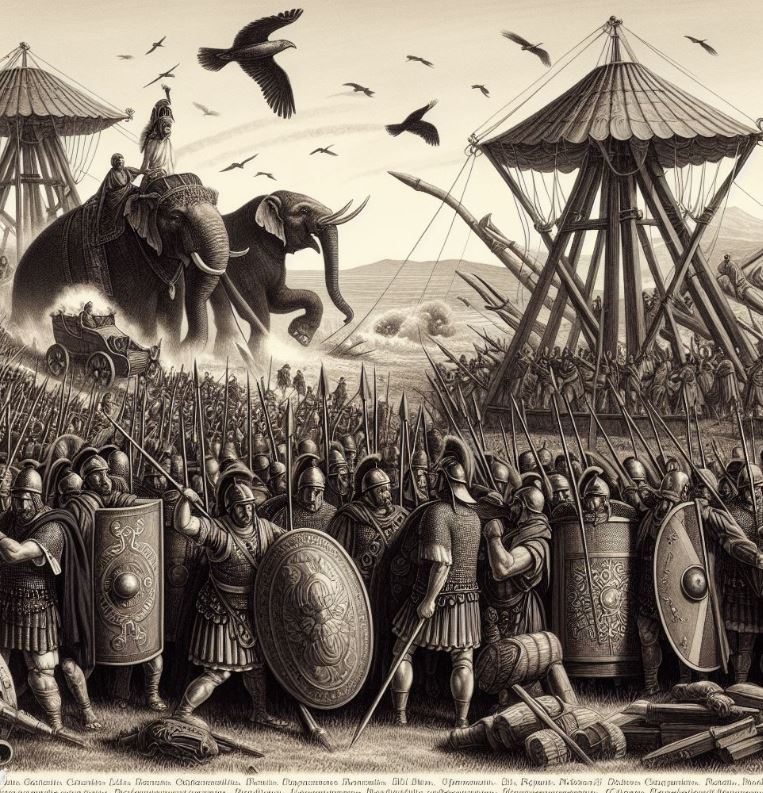Rome, located in the central-western part of the Italian peninsula on the small seven hills, survived amidst the major forces of the Etruscans to the north and the Greek colonies in southern Italy. It wasn’t because Rome was strong, but because it was unattractive. It was merely a small city without fertile land, precious resources, a port to access the sea, or high mountains to block enemies. Nevertheless, Rome began to expand its power by destroying the Etruscans in the north and eventually unified central Italy around 343 BC, heralding the birth of an empire.
Subsequently, Rome bloodlessly occupied Neapolis (Naples) in the south and crossed the Italian peninsula to reach the Adriatic coast. This prompted all the surrounding tribes to form a coalition against Rome, but by around 290 BC, they all surrendered to Rome. What remained on the Italian peninsula were the Greek colonies in the south. The focal point was Tarentum in the far south, a city with a Greek style, which, provoked by Rome, sought help from Epirus in the north. The king of Epirus at the time was King Pyrrhus, a cousin of Alexander the Great. In 279 BC, King Pyrrhus fought a major battle against the Romans near Asculum on the Adriatic coast. Although Pyrrhus initially succeeded, the rapid currents made it difficult to advance with elephants, resulting in heavy losses, and the battle ultimately ended in a Pyrrhic victory for Epirus, as both sides suffered over 15,000 casualties.

According to the Greek historian Plutarch, when his subordinates exulted over the victory, King Pyrrhus said, “One more such victory and we are undone.” Indeed, after a subsequent defeat by Rome, he returned to his homeland, where he died in battle against Sparta. In 1885, the British newspaper The Daily Telegraph referred to Pyrrhus’ victory as a ‘hollow victory,’ thus coining the term ‘Pyrrhic victory’ to mean a victory that comes at a great sacrifice. Pyrrhus’ initial victories helped, albeit inadvertently, to unify Italy under Rome by 270 BC. Hannibal of Carthage regarded him as a greater tactician than even Alexander the Great. However, victories in war are never free. In most cases, they come with a severe cost.
Britain was once called the ’empire on which the sun never sets’ due to its widespread colonies. While the word for Britain is ‘Britain,’ it was once known as the British Empire or Greater Britain. The decline of Britain was due to several factors, but the most significant was World War II. Despite winning the war as part of the Allies, the excessive cost of the war began to tilt the nation’s economy. Britain’s victory came at a tremendous price. Like Pyrrhic victories, all victories come with a cost.
If all the wisdom of the world could be condensed into one sentence, what would it be? The late Cardinal Kim Sou-hwan might propose “Love and share,” though he acknowledged that transferring love from the head to the heart could take 70 years, making it challenging to capture such wisdom briefly. Director Lee Joon-ik, known for the films ‘King and the Clown’ and ‘The Happy Life,’ might suggest “Enjoy!” However, he warns that living extravagantly or showing off enjoyment comes at a cost. Reflecting on this, “Nothing is free” emerges as a succinct summation of global wisdom.
The phrase “Nothing is free” has diverse origins. Legend has it that in ancient times, a wise king tasked scholars with distilling the world’s wisdom. After extensive research, they presented the king with hundreds of volumes. Overwhelmed by the sheer volume, the distilled essence was simply: “Nothing is free.” This maxim later evolved in economic terms to “There ain’t no such thing as a free lunch,” a phrase popularized by American economist Milton Friedman, though he was not its originator. The concept, echoing the ancient wisdom of a legendary king, remains a timeless reminder that everything has a cost.

There ain’t no such thing as a free lunch
The saying “there is no such thing as a free thing” becomes the law of entropy in physics. The law of entropy states that everything in the world moves from order to disorder. Also known as the second law of thermodynamics, it originally states that “in a natural state, all matter increases in disorder.” Left alone, iron rusts, apples rot, and houses deteriorate. Not just material objects, but people too become lazy if left idle, and organizations slacken. If one stops thinking, they become foolish. Preventing this requires a price to be paid. Organizations need new visions and order, and thinking requires constant stimulation.
In physics, the laws of conservation of mass and energy, the economic principle that every choice has a cost, the principle of causality in humanities, the doctrine of original sin in Christianity, and the theory of dependent origination in Buddhism all echo the sentiment that “nothing in this world is free.” This idea is fundamental in religious thought as well. The Christian doctrine of original sin also starts with the concept that nothing is free. Sin began when humans defied the words of their Creator God, as told in the story of the tree of the knowledge of good and evil. As a punishment, men must labor to survive, and women must endure the pain of childbirth.
In Buddhism, the concept of dependent origination suggests that all things arise from various causes and conditions. The phrase “dependent on this, that arises” means that existence is relational, and everything has causes and conditions.
In this sense, learning is the act of paying in advance for the costs that must be borne in the future. Therefore, learning is a way to minimize future costs. The phrase “there is no such thing as a free lunch” means that to gain something, something must be paid. In English, this concept is summed up in the word “trade-off.” A trade-off implies a conflict where choosing one thing requires sacrificing another.
In economics, the concept of equivalent exchange exists. Simply put, it’s the law that the value and price of a product match. The value I gain is exactly what I have paid for. One typically buys a product thinking that the price paid is equal to or lower than the value obtained. From a seller’s perspective, an exchange occurs when the value given up is thought to be equal to or less than the money received. This is the law of exchange.
The law of exchange applies universally, even paradoxically in transactions where competition is also at play. The market is a place where competitive behavior to buy low and sell high occurs. To win in competition, one must offer higher and more value than others, and the associated costs must be minimized. In any case, to win in competition, a price must be paid.



답글 남기기